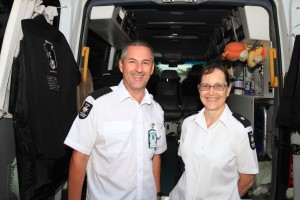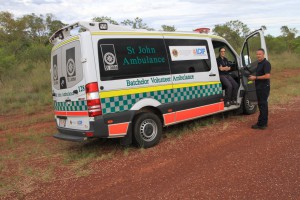Day 8 – What would we do without them?
One thousand kilometers of nothing to do is not to be envied, but in many respects that’s the hope of the volunteer ambulance team on The Borella Ride. We’re fortunate of course – 100 years ago such a concept was impossible.
If Borella or a mate fell off a horse it would be too bad. Get back on – if possible – and keep riding. Otherwise fix your own injuries, rest up, and continue when you could.
The increase in understanding and capabilities of human medicine in a century has been incredible. It was only 50 years ago that “snakebite kits” in Australia consisted of a razor blade to slash the wound, and a rubber cable to tourniquet it. At one stage there was a school of thought that said the first-aider should “suck the poison out of the wound.”
The likelihood of injury to travellers of a century ago was most likely cuts or crushes from coming up against something that could hurt you. Of course, the very concept of an ambulance was alien. Even in cities a vehicle–drawn medical person would have been a doctor arriving in a horse-drawn carriage until around the turn of a century, when he might have had a car.
But state-sponsored medicine – with the government paying to provide a service of experts – is still a relatively new concept.
The Borella Ride is supported by St John Ambulance Australia (NT) Inc.; a not for profit organisation that supplies volunteer first aiders to community events – you’ve most likely seen them at the football and other special events like ANZAC Dawn Services.
Our four team members are:
· Frances Stringer, formerly from Victoria where she was working in patient transport, moved to the NT where she has realised her dream of becoming a fully-qualified paramedic;
· Lorinda Knox, formerly a public servant, who found being a Katherine-based paramedic much more rewarding than being in an office;
· Martin Anderson, helicopter pilot and office manager, who moved around the world from Australia to Japan before taking up full-time work with the organization in Darwin, and
· Peter Poole – one of the first Volunteer Ambulance Officers ever to start work in Darwin, starting in 1979 and who has been assisting the volunteers ever since.
Borella would have been amazed at what is possible these days in medical science, and like us impressed and touched at the extent of human and organizational generosity.
The Borella Ride continues up the Stuart Highway.








